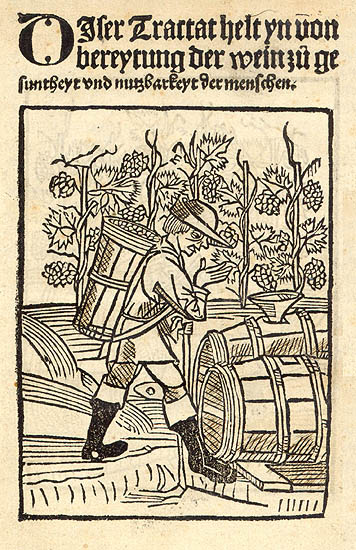No definitive conclusion has been reached on some of the writings which bear the name of Arnau de Vilanova, either because their analysis has revealed a complex formation which may have involved an Arnaldian text which was later altered or merged with other texts, or because there are discrepancies among the experts, or perhaps because it has not yet been thoroughly studied. Apart from the commentary of Galen’s De morbo et accidenti, the following texts fit within this category:
- De venenis (“On poisons”): This is a poorly cobbled together compilation of four pre-existing fragments: a list of theriacs and antidotes; a description of theriac and its virtues; an extensive list of plants, animals and minerals which are supposedly poisonous or harmful; and a compilation of dosages and administration of theriac for illnesses. The most extensive part may be authentic.
- Antidotarium (“Antidotary”): The first part, which examines the general aspects of the job of the apothecary, may be authentic. However, the second part, which compiles almost 200 recipes for all kinds of pharmacological preparations and forms the bulk of the work, cannot be attributed to Arnau because it is not original but instead comes largely from other widely used medieval antidotaries.
- A collection of 73 experimenta or summary reports on medical problems or treatments targeted not only at Clement V but at other figures in the papal court in Avignon.
- De iudiciis astronomiae (“On the judgements of astrology”) consists of an introduction to astrology oriented towards medicine. However, despite admitting that the stars influence health and medicine, the author concludes by saying that astrological calculation is so difficult and obscure that the practical physician should be contented with just observing the location of the Moon, especially when ordering evacuations.
- Libellus de arte cognoscendi venena (“Leaflet on the art of knowing poisons”): Its title is deceptive because it only devotes a few initial lines to describing precautions against poisons and then goes on to describe the symptoms and therapy.
- De urinis (“On the urines”): Numerous texts on diagnosis by inspecting urine circulated under the name of Arnau de Vilanova.
- De aquis medicinalibus (“On the medicinal waters”): This describes pharmacological preparations made with water.
- De simplicibus (“On simples”): This is a catalogue of medicinal plants organised according to their qualities, their pharmacological action and their specific therapeutic operations.
- Cura febris ethicae (“Cure of hectic fever”) is a consilium in response to a colleague’s request for advice on how to treat a patient with hectic fever.
- Regimen quartanae (“Treatment of quartan fever”), is a consilium which provides advice on how to cure a patient’s quartan fever. The author vehemently supports his own therapy over that applied by other physicians, probably outside of academia.
- De epilentia (“On epilepsy”): Some of the brief writings in epilepsy joined to the longer treatise falsely attributed to Arnau (no. 53) may be Arnaldian.
- Abbreviatio libri pronosticorum (“Abbreviation of the Book of Prognostics”): This is a summary of Hippocrates’ treatise on medical prognosis.
Writings that are probably apocryphal:
- De vinis (“On wine”), After a dedication to the king, this has an introduction which praises the merits of wine in general, continues by explaining that simple ingredients heated with wine convey its therapeutic properties to them, and ends by setting forth the procedures for preparing medicinal wines. Then, the bulk of the book consists of an explanation of the composition and preparation of around 50 medicinal wines for treating a wide variety of illnesses.
- De balneis (“On bathing”) discusses the medical value of bathing.
- De sigillis (“On seals”) provides detailed instructions on manufacturing a seal for each of the 12 signs of the zodiac. Under the right astrological conditions, and in the midst of Christian prayers, the zodiac image should be engraved along with Biblical phrases, Hebrew letters, holy names and invocations of saints.
- Libellus regiminis de confortatione visus (“Leaflet on the regimen to strenthen the sight”):The first part is a general health regimen, while the second focuses on healing the sight, a copy of Mesué the Younger.
